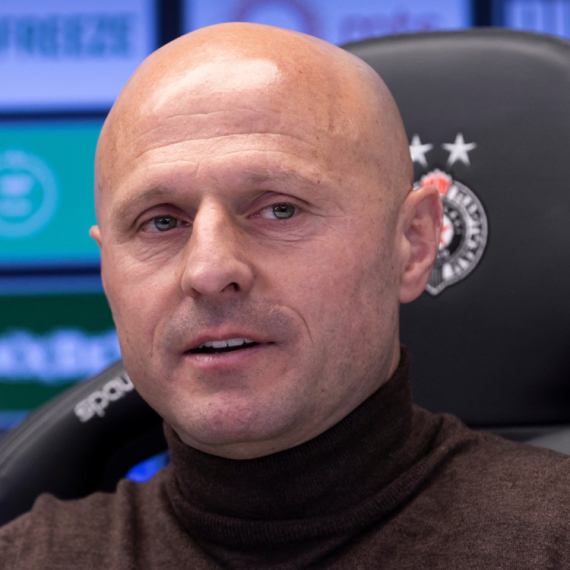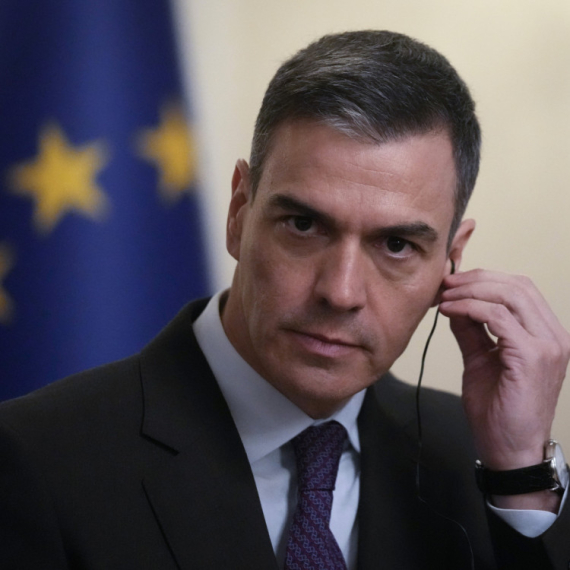Hungarian government in crisis
Hungary's Socialist Prime Minister Ferenc Gyurcsany Monday sacked the health minister, Reuters says.
Monday, 31.03.2008.
10:43

Hungary's Socialist Prime Minister Ferenc Gyurcsany Monday sacked the health minister, Reuters says. The minister is a member of junior coalition partner the Free Democrats – analysts said the move may cause the government to split. Hungarian government in crisis The row between Gyurcsany's Socialists and the smaller Alliance of Free Democrats, both reeling from poor poll ratings, spells the end of Hungary's economic reforms, may imperil its budget deficit cuts and possibly see the prime minister ousted. Although the parties have served three terms together, from 1994-1998 and from 2002 through elections in 2006 to the present day in a frequently tetchy relationship, the Free Democrats may finally decide to quit at a meeting later on Monday. The Socialists tried to play down the impact of Health Minister Agnes Horvath's dismissal, which came after the government suffered a big defeat at the hands of the opposition in a referendum earlier this month. "I think this coalition will stay together until (elections in) 2010. I think that both partners will see that in terms of stability, maintaining the coalition is key but I think we will need to revise our political goals," said Ferenc Juhasz, deputy president of the Socialist Party told M1 state television. "I don't think that the fate of the coalition should depend on one person," he said. But political analysts said the Free Democrats who brought down Gyurcsany's predecessor Peter Medgyessy in 2004 may decide they have little to lose from leaving the coalition. "Ferenc Gyurcsany has committed a very serious tactical mistake if he wants to hold on to his position. I think he has opened a Pandora's box," said political analyst Gabor Torok. The outcome of the crisis will be closely watched by investors who hold billions of dollars of Hungarian bonds and who are already nervous about a possible return to overspending ahead of a 2010 election. Gyurcsany had also told his party at a meeting on Saturday that he would back off health reforms which were the signature policy of his allies and renegotiate the deal under which the two parties rule. Gyurcsany was acting to stave off a possible revolt in his party after a huge defeat in a referendum this month in which almost a million Socialist voters sided with the opposition to strike down key parts of the government's reform agenda. But the price may be that the economically liberal Free Democrats, who have 20 seats in parliament, decide on Monday to cut and run despite polling just one percent, a figure that would see them wiped out if an election was held now. It could still be possible for the Socialists to continue to rule in an informal alliance with the smaller party, or they might tempt some Free Democrats to join them as with 190 seats Gyurcsany's party is just 4 short of a parliamentary majority. Despite assurances from Gyurcsany that the government would stick to plans to cut the budget deficit, which it projects will fall to 3.2 percent of gross domestic product in 2009, few investors are in a forgiving mood, mindful of past excesses. Gyurcsany's Socialists and the Free Democrats won re-election in 2006 on the back of large tax cuts and spending rises which resulted in the budget deficit ballooning to 9.2 percent of GDP, the largest in the European Union.
Hungarian government in crisis
The row between Gyurcsany's Socialists and the smaller Alliance of Free Democrats, both reeling from poor poll ratings, spells the end of Hungary's economic reforms, may imperil its budget deficit cuts and possibly see the prime minister ousted.Although the parties have served three terms together, from 1994-1998 and from 2002 through elections in 2006 to the present day in a frequently tetchy relationship, the Free Democrats may finally decide to quit at a meeting later on Monday.
The Socialists tried to play down the impact of Health Minister Agnes Horvath's dismissal, which came after the government suffered a big defeat at the hands of the opposition in a referendum earlier this month.
"I think this coalition will stay together until (elections in) 2010. I think that both partners will see that in terms of stability, maintaining the coalition is key but I think we will need to revise our political goals," said Ferenc Juhasz, deputy president of the Socialist Party told M1 state television.
"I don't think that the fate of the coalition should depend on one person," he said.
But political analysts said the Free Democrats who brought down Gyurcsany's predecessor Peter Medgyessy in 2004 may decide they have little to lose from leaving the coalition.
"Ferenc Gyurcsany has committed a very serious tactical mistake if he wants to hold on to his position. I think he has opened a Pandora's box," said political analyst Gabor Torok.
The outcome of the crisis will be closely watched by investors who hold billions of dollars of Hungarian bonds and who are already nervous about a possible return to overspending ahead of a 2010 election.
Gyurcsany had also told his party at a meeting on Saturday that he would back off health reforms which were the signature policy of his allies and renegotiate the deal under which the two parties rule.
Gyurcsany was acting to stave off a possible revolt in his party after a huge defeat in a referendum this month in which almost a million Socialist voters sided with the opposition to strike down key parts of the government's reform agenda.
But the price may be that the economically liberal Free Democrats, who have 20 seats in parliament, decide on Monday to cut and run despite polling just one percent, a figure that would see them wiped out if an election was held now.
It could still be possible for the Socialists to continue to rule in an informal alliance with the smaller party, or they might tempt some Free Democrats to join them as with 190 seats Gyurcsany's party is just 4 short of a parliamentary majority.
Despite assurances from Gyurcsany that the government would stick to plans to cut the budget deficit, which it projects will fall to 3.2 percent of gross domestic product in 2009, few investors are in a forgiving mood, mindful of past excesses.
Gyurcsany's Socialists and the Free Democrats won re-election in 2006 on the back of large tax cuts and spending rises which resulted in the budget deficit ballooning to 9.2 percent of GDP, the largest in the European Union.






































Komentari 0